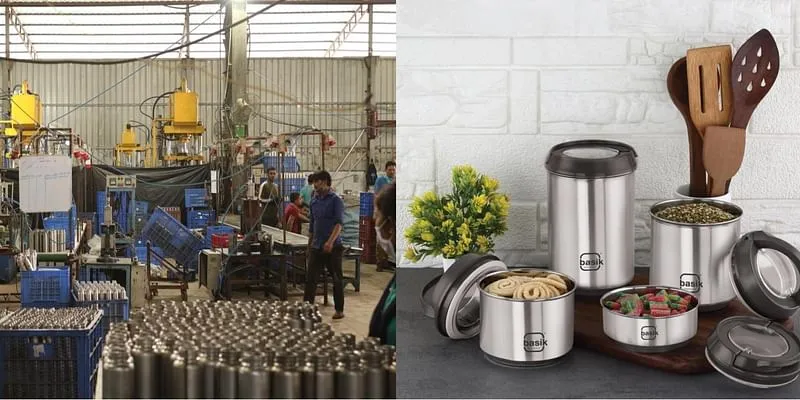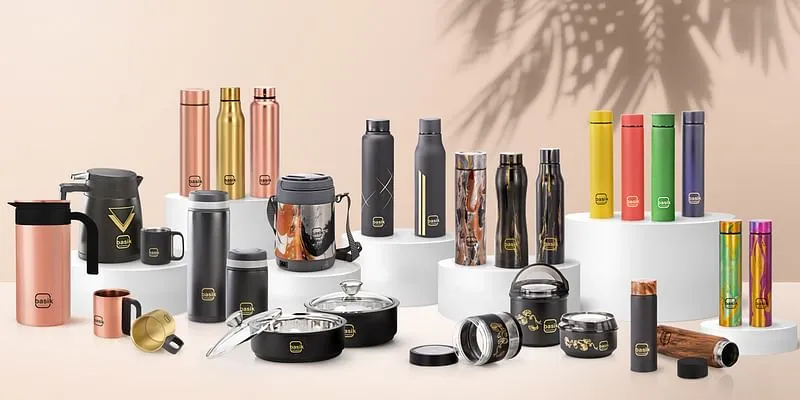Basik Homeware wants to make stainless steel products pretty and pocket-friendly
The Mumbai-based homeware brand is keen to give the good old stainless steel an aesthetic spin and reduce India’s dependency on imported containers and kitchenware.
Stainless steel may be durable and ecofriendly, but stainless-steel boxes and containers are often considered dull and boring. wants to change that perception with a line of stainless-steel products that are functional, safe, stylish and pocket-friendly.
Mumbai-based Basik Homeware was founded in 2016 by siblings Vidhi Jain, a former fashion designer, and Viral Jain, who has worked in his family homeware business. The siblings, who had grown up around homeware, realised that it was only fitting to start a business of their own in the same industry.
According to Vidhi, Indian consumers want products that are colourful, refreshing in terms of design, and also affordable. And this is what Basik Homeware wants to give consumers.
The homegrown brand offers a range of storage items such as vacuum flasks, tiffin boxes, water jugs, casseroles, and coffee mugs in a range of colours and designs, priced between Rs 100 and Rs 1000.
Basik Homeware aims to make stainless steel products affordable to people of various income groups. “Stainless steel is generally expensive due to the higher cost of production. Basik Homeware products are about 25% cheaper compared to other brands in the market. We’ve eliminated the cost of importing raw materials," says Viral.
“Many stainless-steel products get imported from China; customers pay a higher cost for good quality. This leads to certain economic classes being denied the chance to own good quality homeware. We want to give people the same quality at a better cost,” says Vidhi.

Besides offering an affordable and stylish range of products, the company also wants to give consumers an ecofriendly alternative to plastic, which seems to have pervaded the homeware market. While its products are primarily made from stainless steel, some parts are made from BPA-free plastic.
How it began
The duo built the brand with a loan of Rs 2 crore; they also availed themselves of additional financial assistance from government schemes such as ‘Atmanirbhar Bharat’.
Initially, Vidhi and Viral faced challenges in executing their plan, hiring a technically skilled workforce, setting up quality infrastructure, and managing the operations to sustain the business. The next hurdle was the pandemic.
“During the pandemic, sales dipped and production staggered because a majority of the workforce wasn’t available. Since we’re dependent on vendors and suppliers for raw material, the working capital flow chain halted due to a financial crunch. After conceptualising and waiting for things to settle, we decided to rethink our distribution and supplier channels,” elaborates Viral.
Manufacturing and supply
Basik Homeware has a manufacturing unit in the industrial hub of Vapi in Gujarat.
Workers for the factory were hired as apprentices from nearby areas and trained to handle state-of-the-art machinery under the government’s Skill India campaign. Later they were employed full-time.
On the supply side, the company has tie-ups with big brands such as Jindal and Salem Steel for sourcing stainless steel. The steel is recyclable, anti-bacterial and sustainable, according to the company. “We want to work with a raw material that’s durable, long-lasting and supplied by reliable vendors,” says Viral.
The company is keen to produce everything inhouse and reduce the country’s dependency on imported products. Viral says, “During the pandemic, the import sector was in trouble with respect to logistics. It was a big hassle to bring raw materials from abroad. So, we decided to manufacture products in-house to make things more convenient. It also aligned with our values of being more self-reliant."

(L) Basik Homeware's manufacturing unit in Vapi, Gujarat; (R) The brand's stainless-steel products
Innovative design
The brand experiments with designs and colours to give its products a contemporary touch and an attractive look. It collaborates with independent artists and graphic designers for the same.
Basik Homeware’s Gold Leaf collection features products with a black-and-gold combination and a matte finish, while its Junglee Summer collection targets school-going children, with fresh and vibrant colours and cartoon characters. The packaging contains games and puzzles to attract children. There’s another collection in the pipeline targeted at young urban customers.
The company uses processes such as spray painting, power coating, screen printing, and hot stamp foiling for colour, texture and printing. The dyes used in the paints are food safe, says the company founder.

Basik Homeware's range of products
Revenue model
Basik Homeware generated a revenue of Rs 27 crore in FY2022, selling 3 lakh units per month. The company is aiming for Rs 60 crore in FY2023.
Basik Homeware’s products are sold through retail outlets such as D-Mart, Reliance, Walmart India, Lifestyle, Star Bazaar, and Metro Cash and Carry across the country. The company’s products are also available online on its own website and on Flipkart and Amazon.
The company has also partnered with local distributors in Maharashtra, Gujarat and Rajasthan. It plans to spread distribution to the markets of Delhi, Punjab, Uttar Pradesh, Tamil Nadu, Kerala, Telangana and Karnataka.
Apart from retail customers, the company also has B2B clients in the corporate gifting space. Basik Homeware has also partnered with brands like Sun Pharma, Wagh Bakri Tea and Ambuja Cement to offer promotional giveaways.
Expansion plan
Going forward, the company is looking to ramp up its current manufacturing capacity of 10,000 units per day, expand its workforce, and import new machinery. It is also in the process of acquiring a 10-acre land for setting up another manufacturing unit.
Basik Homeware plans to bring in investors and go public in three to four years. In the next five years, the company wants to expand its presence in the Indian kitchenware market, which is worth over $80 million.
(The story has been updated to correct a typo.)
Edited by Swetha Kannan







